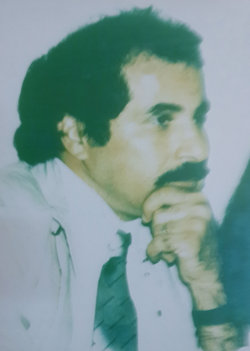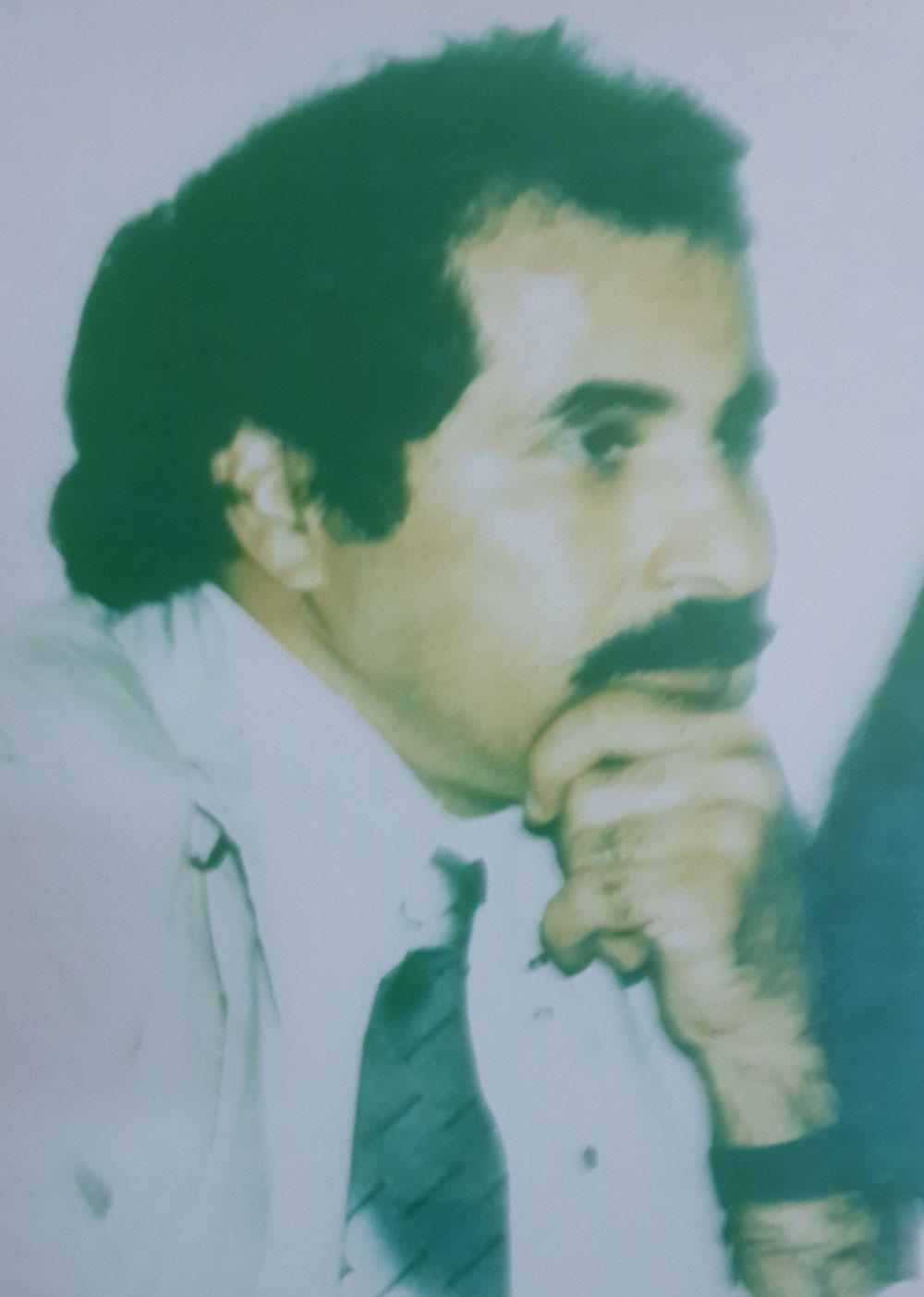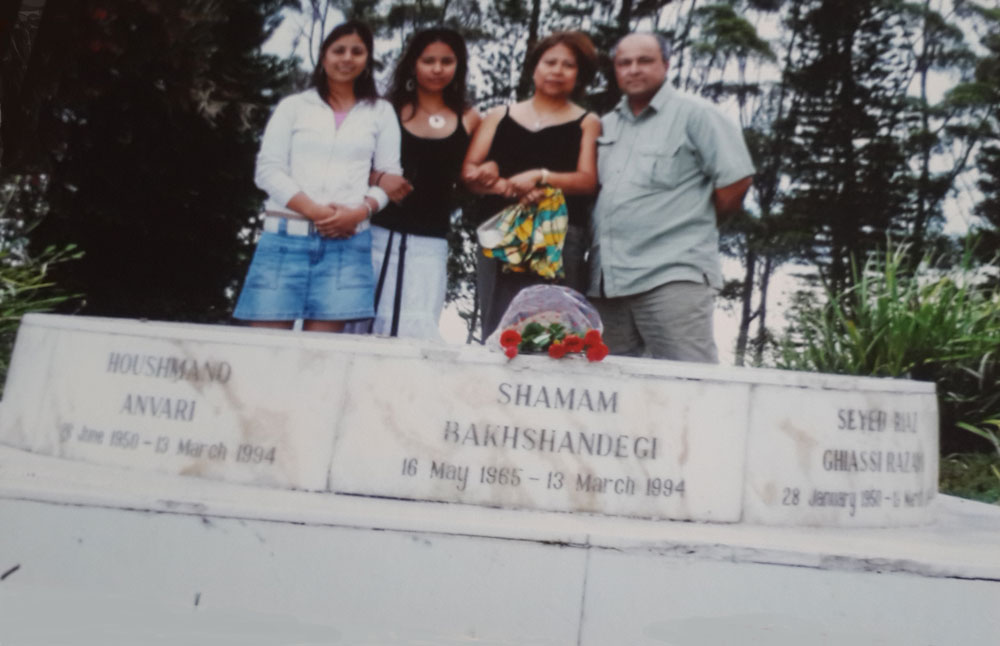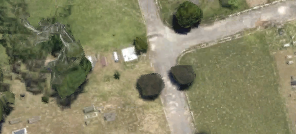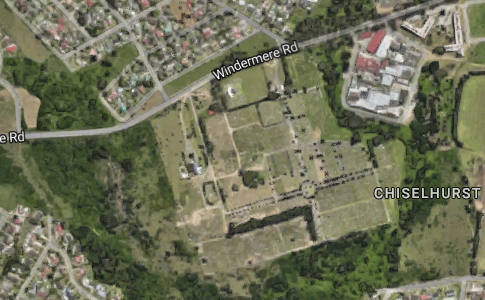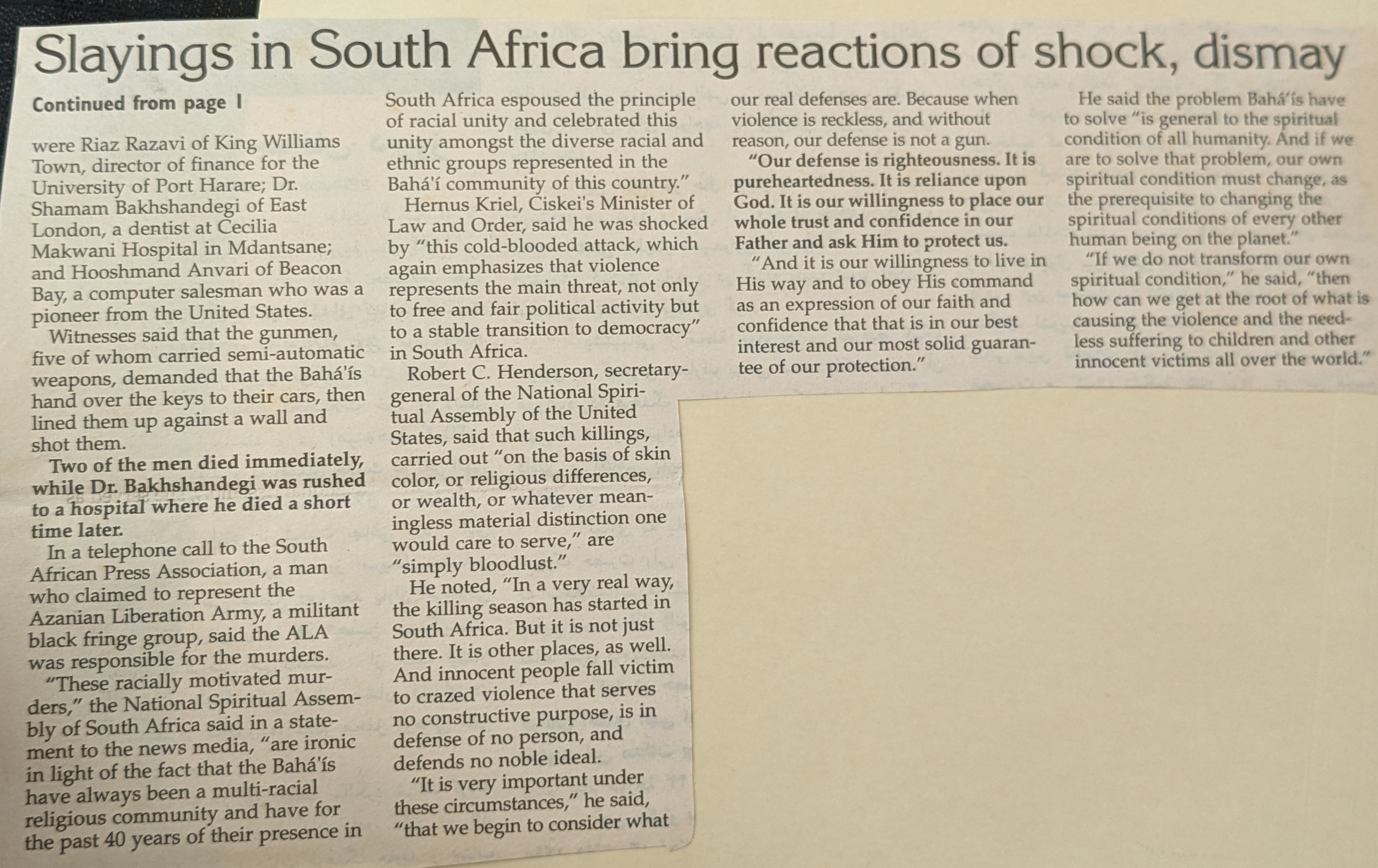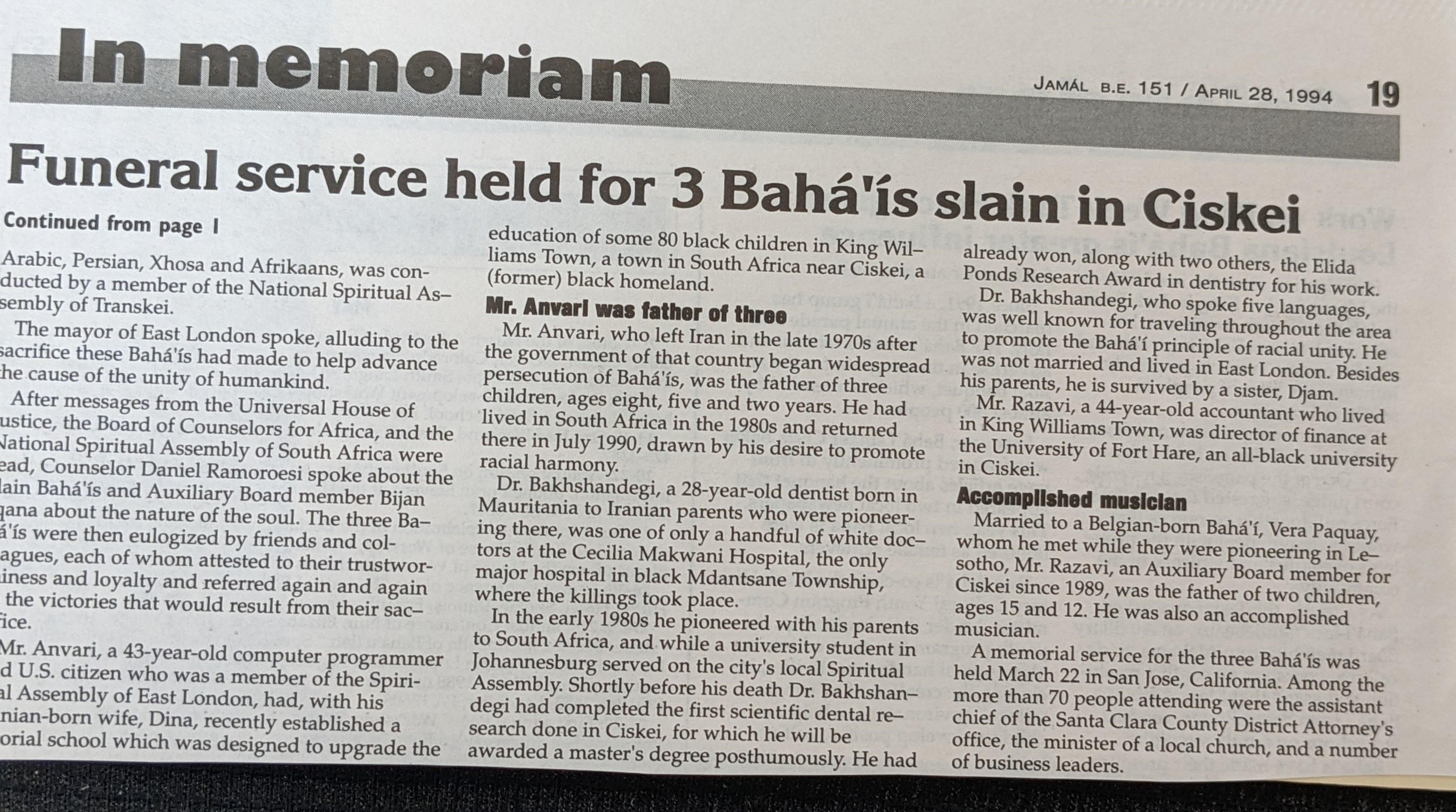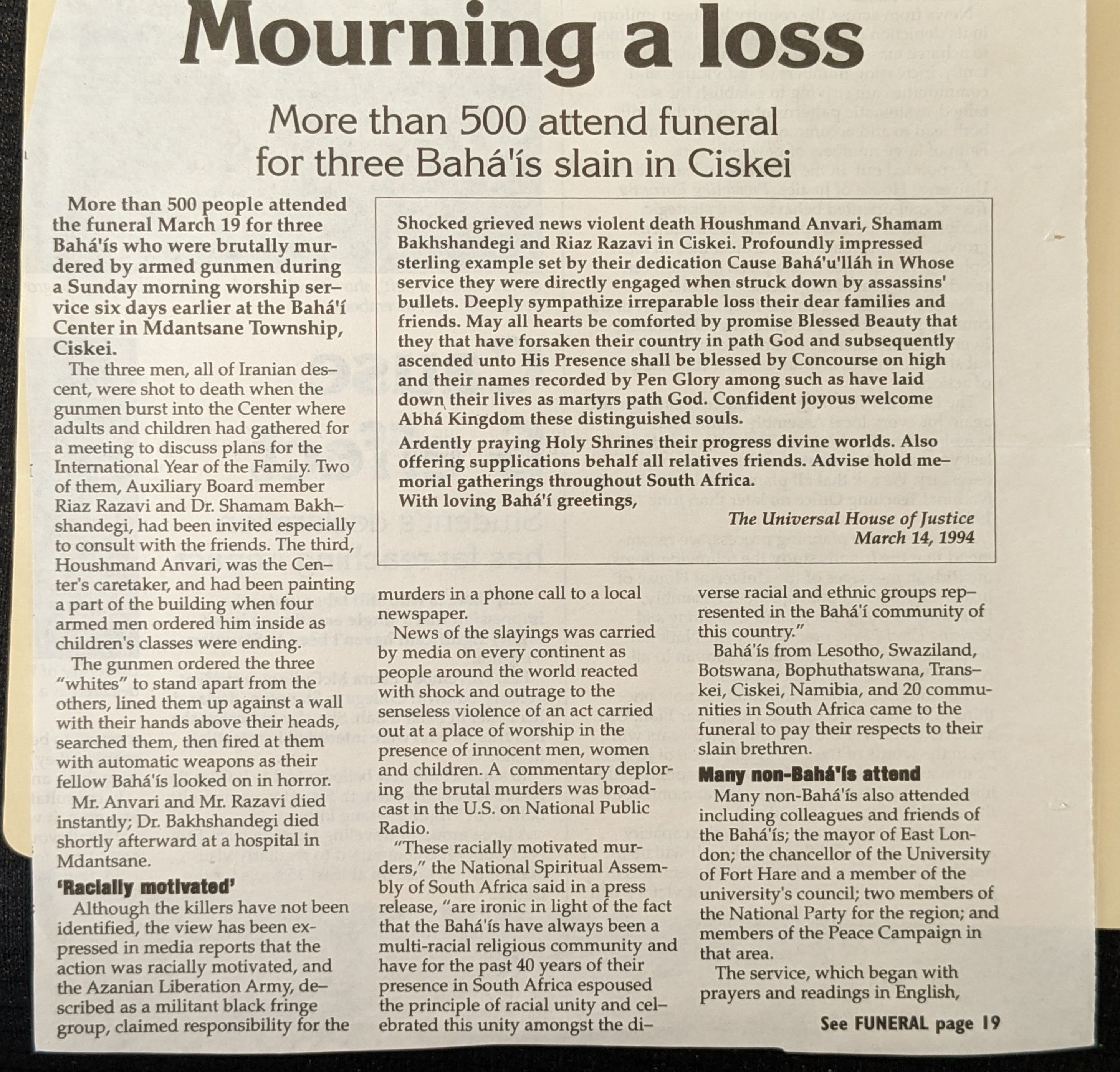HOUSHMAND ANVARI
Houshmand Alex Anvari was born into a Baha'i family on June 20, 1950, in Yazd, Iran. His family was the target of persecution and harassment from fanatical elements in that town. Houshmand completed his primary schooling there and then moved to Tehran where he finished secondary school. He continued his studies, enrolling in the Institute of Insurance at the University of Tehran and graduating with a bachelor of arts degree in industrial and commercial insurance in 1976. He satisfied the requirements for compulsory military service, and when the Iranian revolution began, he moved to the United States.
Houshmand studied computer programming and found employment with Control Data Corporation and later became a Branch Manager for McDonald's Corporation. In April 1985 he settled briefly in South Africa, where he worked for the Alianz Life Insurance Company based in Johannesburg. He went back to the United States in 1986 and worked as a computer consultant.
In December 1983 he married Dina Toufiqi and with her had three children, Vaffa, Nava, and Ava. In 1990 Houshmand returned with his family to South Africa, and they were encouraged by the National Assembly to take up residence in the East London region where they could be of assistance to South Africa and Ciskei. He and his wife established a day nursery at the Mdantsane Baha'i Centre. Later they founded a weekend tutorial school at King Williams Town. Houshmand's work was instrumental in the development of the Baha'i Centre in Lasmesi, and he served on the Spiritual Assembly of East London. He was residing in East London at the time of his death.
He had recently taken part in an entry-by-troops project in the northwest part of the country, making a two-week traveling teaching trip to KwaNdbele.
Houshmand was the caretaker and manager of the Mdantsane Baha'i Centre and was painting the door of the Centre when the gunmen attacked.
Houshmand leaves his wife and three children, Vaffa, Nava, and Ava aged eight, six, and three respectively.
More than five hundred people attended the funeral that was held first at the Cambridge Town Hall in East London,
which was magnificently decorated with masses of flowers and where the coffins were placed side by side. Baha'is came from Lesotho, Swaziland, Botswana, Bophuthatswana, Transkei, Ciskei, and Namibia as well as some twenty different communities in South Africa.
The program was conducted by the chairman of the Spiritual Assembly of Transkei and included addresses by the mayor of
East London and Counsellor Daniel Ramoroesi. Messages from the Universal House of Justice and the Continental Board
of Counsellors for Africa were read by Counsellor Lally Warren. The program concluded with eulogies. The chancellor of the University of Fort Hare offered one for Riaz Ghiassi-Razavi. Two of Dr. Sham am Bakhshandegi's colleagues from the hospital spoke of him, and Nariman Khayitash read a short account of the life of Houshmand Anvari written by Houshmand's father.
Following the program in the Town Hall, the friends went to the Cambridge cemetery where the graves had been dug side by side. Prayers were chanted and the Baha'i prayer for the death was recited. Beautiful, continuous chanting was heard whilst family, friends and colleagues' started to close the graves and place the many flowers on them, whilst slowly the sun, with a magnificent array of colors, descended below the horizon.
The martyrdoms attracted the attention of the international media. All of the major television and radio networks around the country reported the event and mentioned the name of the Faith. Radio coverage included a well-known talk show on an American network and interviews on the BBC World Service and Radio France International. Local newspapers that had previously refused to publish material about the Faith suddenly vied with one another to print articles. Even Iranian newspapers reported the event and mentioned that the victims were Baha'is.
Messages of condolence poured in from all over the world. The World Conference on Religion and Peace, The International Red Cross, the Catholic Bishops Conference, the South African Council of Churches and many more. The University of Fort Hare issued letters and statements expressing their support for the Baha'is and their shock at the tragedy.
Memorial services held in other countries were well attended, attracting government representatives and dignitaries. On the day the memorial service was held in Namibia, the Local Assembly of Windhoek planned a teaching campaign in memory
of the martyrs, and the entire body of the National Assembly left its regularly scheduled meeting to support the campaign.
Three ten-day teaching campaigns were subsequently planned by the National Teaching Committee, each dedicated to
one of the three martyrs.
The Baha’i World In Memoriam page 128
SHOCKED GRIEVED NEWS VIOLENT DEATH HOUSHMAND ANVARI, SHAMAM BAKHSHANDEGI AND RIAZ RAZAVI IN CISKEI.
PROFOUNDLY IMPRESSED STERLING EXAMPLE SET BY THEIR DEDICATION CAUSE BAHA'U'LLAH IN WHOSE SERVICE THEY WERE DIRECTLY ENGAGED WHEN STRUCK DOWN BY ASSASSINS ' BULLETS. DEEPLY SYMPATHIZE IRREPARABLE LOSS THEIR DEAR FAMILIES AND FRIENDS. MAY ALL HEARTS BE COMFORTED BY PROMISE BLESSED BEAUTY THAT THEY THAT HAVE FORSAKEN THEIR COUNTRY IN PATH GOD AND SUBSEQUENTLY ASCENDED UNTO HIS PRESENCE SHALL BE BLESSED BY CONCOURSE ON HIGH AND THEIR NAMES RECORDED BY PEN GLORY AMONG SUCH AS HAVE LAID DOWN THEIR LIVES AS MARTYRS PATH GOD. CONFIDENT JOYOUS WELCOME ABHA KINGDOM THESE DISTINGUISHED SOULS. ARDENTLY PRAYING HOLY SHRINES THEIR PROGRESS DIVINE WORLDS. ALSO OFFERING SUPPLICATIONS BEHALF ALL RELATIVES FRIENDS. ADVISE HOLD MEMORIAL GATHERINGS THROUGHOUT SOUTH AFRICA.
Universal House of Justice
March 14, 1994
Three of the Baha'is of Ciskei who were eyewitnesses to the occasion shared with the friends the account of what happened on Sunday, March 13, 1994.
The three women were members of the National Assembly of Ciskei as well as the Local Assembly of Mdantsane. One of the women, named Thenjiwe Rusi, explained, "The Spiritual Assembly of Mdantsane had invited these friends Dr. Shamam Bakhshandegi and Riaz Ghiassi-Razavi to come and consult about the International Year of the Family, to help us select appropriate writings and formulate a plan." Another woman, Tammy, was first to describe what had happened. She explained that she had come to clean the Mdantsane Baha'i Centre in preparation for the meeting. She had expected to be the first to arrive, but she found Houshmand Anvari, who acted as caretaker and manager of the Baha'i Centre, busy painting. There were also several children who had been attending children's classes. Tammy said that Houshmand joked and teased her and the children. Shamam arrived with a few others. He greeted them saying ''Allah'u'Abha'' and shook hands with everyone, including the children. He joked about the meeting, commenting that there were more children than adults.
Then Riaz entered, and after greetings, everyone sat down. They said some prayers together and were singing and waiting for the other Assembly members to arrive when Houshmand came in with his hands in the air, smiling and doing a little jig. Tammy said she did not realize that a gun was being held to his back. Houshmand continued to joke, but then the four gunmen became very aggressive. They said, "Boers (whites) to one side." The three pioneers very gently and without any fuss got up and stood against the wall away from the local Baha'is, Riaz standing in the middle with Shamam on the left and Houshmand on the right. The latter smiled at them continuously, Riaz's lips moved in prayer, and Shamam looked down and then heavenward. No one thought that anything serious was going to happen, perhaps only a robbery.
One of the men went to check the pioneers' pockets. They did this very aggressively, pulling the pockets until they tore, taking money and car keys and throwing documents and other things back at the three believers. The three victims remained calm, giving the impression to the local Baha'is that there was no real danger. The Baha'is had been saying Allah'u'Abhas' loudly and were told by the gunmen to be quiet, but they carried on as this made the victims smile. Tammy said she covered her face as she was very upset, and then suddenly she heard a single shot followed by a burst of machine gun fire. She said she thought they were all being shot. When the shooting stopped, there was absolute silence. The gunmen fled, taking Riaz's car. They had not taken money or watches.
Tammy said that she opened her eyes to a room filled with smoke and dust and that she rushed out to stop from choking. She then took the children outside and tried to get them over the wall to go and get help, but there were dogs on the other side.
Mrs. Shumi (Esther Nkonzo) continued, "There were four women and nine children in the room where the incident occurred. Only four of the members of the Assembly were present so we waited for others to come. I remember looking at my watch and it was 11:52 AM. Then everything happened so quickly that we did not realize anything was wrong. When the gunmen came and demanded that we separate, one of the children clung to the leg of one of the pioneers and was roughly pulled away by one of the gunmen. After the first shots were heard, I saw Riaz and Houshmand on the ground and Shamam leaning against the wall and slowly falling down." After the gunmen fled, she went to look at the bodies. She held Houshmand's and Riaz's hands and said that they were dead and that she said prayers for them. Tammy said, "I came and saw that Shaman was still alive. I held his hand and called to him to squeeze my hand if he could hear and he did. I called for help to get him to hospital. We got him there and the surgeons came running as I shouted, 'Shamam has been shot' and they rushed him to the theatre, but they could not save him." This is the same Cecilia Makiwane Community Hospital where Shamam and his father, Dr. Amin Bakhshandegi, were practicing dental surgeons. Shamam's colleagues tried their best to save his life. His father was on duty at the time, and he was called to the intensive care unit; by the time he arrived, Shaman had died.
As these friends recounted the incidents, everyone was greatly moved, and the ninety-three-year-old father of Houshmand Anvari stood and gave a short talk, comforting everyone, saying that great blessings had been given by these martyrdoms not only for the families but for South Africa and the Baha'i Community.
Based on information provided by The Continental Board of Counsellors for Africa, The National Spiritual Assembly of the Baha'is of Ciskei, The National Spiritual Assembly of the Baha'is of South Africa, and The National Spiritual Assembly of the Baha'is of Namibia and family members.
Corrections were made by the family from the original text.
HOUSHMAND ANVARI
Houshmand Alex Anvari was born into a Baha'i family on June 20, 1950, in Yazd, Iran. His family was the target of persecution and harassment from fanatical elements in that town. Houshmand completed his primary schooling there and then moved to Tehran where he finished secondary school. He continued his studies, enrolling in the Institute of Insurance at the University of Tehran and graduating with a bachelor of arts degree in industrial and commercial insurance in 1976. He satisfied the requirements for compulsory military service, and when the Iranian revolution began, he moved to the United States.
Houshmand studied computer programming and found employment with Control Data Corporation and later became a Branch Manager for McDonald's Corporation. In April 1985 he settled briefly in South Africa, where he worked for the Alianz Life Insurance Company based in Johannesburg. He went back to the United States in 1986 and worked as a computer consultant.
In December 1983 he married Dina Toufiqi and with her had three children, Vaffa, Nava, and Ava. In 1990 Houshmand returned with his family to South Africa, and they were encouraged by the National Assembly to take up residence in the East London region where they could be of assistance to South Africa and Ciskei. He and his wife established a day nursery at the Mdantsane Baha'i Centre. Later they founded a weekend tutorial school at King Williams Town. Houshmand's work was instrumental in the development of the Baha'i Centre in Lasmesi, and he served on the Spiritual Assembly of East London. He was residing in East London at the time of his death.
He had recently taken part in an entry-by-troops project in the northwest part of the country, making a two-week traveling teaching trip to KwaNdbele.
Houshmand was the caretaker and manager of the Mdantsane Baha'i Centre and was painting the door of the Centre when the gunmen attacked.
Houshmand leaves his wife and three children, Vaffa, Nava, and Ava aged eight, six, and three respectively.
More than five hundred people attended the funeral that was held first at the Cambridge Town Hall in East London,
which was magnificently decorated with masses of flowers and where the coffins were placed side by side. Baha'is came from Lesotho, Swaziland, Botswana, Bophuthatswana, Transkei, Ciskei, and Namibia as well as some twenty different communities in South Africa.
The program was conducted by the chairman of the Spiritual Assembly of Transkei and included addresses by the mayor of
East London and Counsellor Daniel Ramoroesi. Messages from the Universal House of Justice and the Continental Board
of Counsellors for Africa were read by Counsellor Lally Warren. The program concluded with eulogies. The chancellor of the University of Fort Hare offered one for Riaz Ghiassi-Razavi. Two of Dr. Sham am Bakhshandegi's colleagues from the hospital spoke of him, and Nariman Khayitash read a short account of the life of Houshmand Anvari written by Houshmand's father.
Following the program in the Town Hall, the friends went to the Cambridge cemetery where the graves had been dug side by side. Prayers were chanted and the Baha'i prayer for the death was recited. Beautiful, continuous chanting was heard whilst family, friends and colleagues' started to close the graves and place the many flowers on them, whilst slowly the sun, with a magnificent array of colors, descended below the horizon.
The martyrdoms attracted the attention of the international media. All of the major television and radio networks around the country reported the event and mentioned the name of the Faith. Radio coverage included a well-known talk show on an American network and interviews on the BBC World Service and Radio France International. Local newspapers that had previously refused to publish material about the Faith suddenly vied with one another to print articles. Even Iranian newspapers reported the event and mentioned that the victims were Baha'is.
Messages of condolence poured in from all over the world. The World Conference on Religion and Peace, The International Red Cross, the Catholic Bishops Conference, the South African Council of Churches and many more. The University of Fort Hare issued letters and statements expressing their support for the Baha'is and their shock at the tragedy.
Memorial services held in other countries were well attended, attracting government representatives and dignitaries. On the day the memorial service was held in Namibia, the Local Assembly of Windhoek planned a teaching campaign in memory
of the martyrs, and the entire body of the National Assembly left its regularly scheduled meeting to support the campaign.
Three ten-day teaching campaigns were subsequently planned by the National Teaching Committee, each dedicated to
one of the three martyrs.
The Baha’i World In Memoriam page 128
SHOCKED GRIEVED NEWS VIOLENT DEATH HOUSHMAND ANVARI, SHAMAM BAKHSHANDEGI AND RIAZ RAZAVI IN CISKEI.
PROFOUNDLY IMPRESSED STERLING EXAMPLE SET BY THEIR DEDICATION CAUSE BAHA'U'LLAH IN WHOSE SERVICE THEY WERE DIRECTLY ENGAGED WHEN STRUCK DOWN BY ASSASSINS ' BULLETS. DEEPLY SYMPATHIZE IRREPARABLE LOSS THEIR DEAR FAMILIES AND FRIENDS. MAY ALL HEARTS BE COMFORTED BY PROMISE BLESSED BEAUTY THAT THEY THAT HAVE FORSAKEN THEIR COUNTRY IN PATH GOD AND SUBSEQUENTLY ASCENDED UNTO HIS PRESENCE SHALL BE BLESSED BY CONCOURSE ON HIGH AND THEIR NAMES RECORDED BY PEN GLORY AMONG SUCH AS HAVE LAID DOWN THEIR LIVES AS MARTYRS PATH GOD. CONFIDENT JOYOUS WELCOME ABHA KINGDOM THESE DISTINGUISHED SOULS. ARDENTLY PRAYING HOLY SHRINES THEIR PROGRESS DIVINE WORLDS. ALSO OFFERING SUPPLICATIONS BEHALF ALL RELATIVES FRIENDS. ADVISE HOLD MEMORIAL GATHERINGS THROUGHOUT SOUTH AFRICA.
Universal House of Justice
March 14, 1994
Three of the Baha'is of Ciskei who were eyewitnesses to the occasion shared with the friends the account of what happened on Sunday, March 13, 1994.
The three women were members of the National Assembly of Ciskei as well as the Local Assembly of Mdantsane. One of the women, named Thenjiwe Rusi, explained, "The Spiritual Assembly of Mdantsane had invited these friends Dr. Shamam Bakhshandegi and Riaz Ghiassi-Razavi to come and consult about the International Year of the Family, to help us select appropriate writings and formulate a plan." Another woman, Tammy, was first to describe what had happened. She explained that she had come to clean the Mdantsane Baha'i Centre in preparation for the meeting. She had expected to be the first to arrive, but she found Houshmand Anvari, who acted as caretaker and manager of the Baha'i Centre, busy painting. There were also several children who had been attending children's classes. Tammy said that Houshmand joked and teased her and the children. Shamam arrived with a few others. He greeted them saying ''Allah'u'Abha'' and shook hands with everyone, including the children. He joked about the meeting, commenting that there were more children than adults.
Then Riaz entered, and after greetings, everyone sat down. They said some prayers together and were singing and waiting for the other Assembly members to arrive when Houshmand came in with his hands in the air, smiling and doing a little jig. Tammy said she did not realize that a gun was being held to his back. Houshmand continued to joke, but then the four gunmen became very aggressive. They said, "Boers (whites) to one side." The three pioneers very gently and without any fuss got up and stood against the wall away from the local Baha'is, Riaz standing in the middle with Shamam on the left and Houshmand on the right. The latter smiled at them continuously, Riaz's lips moved in prayer, and Shamam looked down and then heavenward. No one thought that anything serious was going to happen, perhaps only a robbery.
One of the men went to check the pioneers' pockets. They did this very aggressively, pulling the pockets until they tore, taking money and car keys and throwing documents and other things back at the three believers. The three victims remained calm, giving the impression to the local Baha'is that there was no real danger. The Baha'is had been saying Allah'u'Abhas' loudly and were told by the gunmen to be quiet, but they carried on as this made the victims smile. Tammy said she covered her face as she was very upset, and then suddenly she heard a single shot followed by a burst of machine gun fire. She said she thought they were all being shot. When the shooting stopped, there was absolute silence. The gunmen fled, taking Riaz's car. They had not taken money or watches.
Tammy said that she opened her eyes to a room filled with smoke and dust and that she rushed out to stop from choking. She then took the children outside and tried to get them over the wall to go and get help, but there were dogs on the other side.
Mrs. Shumi (Esther Nkonzo) continued, "There were four women and nine children in the room where the incident occurred. Only four of the members of the Assembly were present so we waited for others to come. I remember looking at my watch and it was 11:52 AM. Then everything happened so quickly that we did not realize anything was wrong. When the gunmen came and demanded that we separate, one of the children clung to the leg of one of the pioneers and was roughly pulled away by one of the gunmen. After the first shots were heard, I saw Riaz and Houshmand on the ground and Shamam leaning against the wall and slowly falling down." After the gunmen fled, she went to look at the bodies. She held Houshmand's and Riaz's hands and said that they were dead and that she said prayers for them. Tammy said, "I came and saw that Shaman was still alive. I held his hand and called to him to squeeze my hand if he could hear and he did. I called for help to get him to hospital. We got him there and the surgeons came running as I shouted, 'Shamam has been shot' and they rushed him to the theatre, but they could not save him." This is the same Cecilia Makiwane Community Hospital where Shamam and his father, Dr. Amin Bakhshandegi, were practicing dental surgeons. Shamam's colleagues tried their best to save his life. His father was on duty at the time, and he was called to the intensive care unit; by the time he arrived, Shaman had died.
As these friends recounted the incidents, everyone was greatly moved, and the ninety-three-year-old father of Houshmand Anvari stood and gave a short talk, comforting everyone, saying that great blessings had been given by these martyrdoms not only for the families but for South Africa and the Baha'i Community.
Based on information provided by The Continental Board of Counsellors for Africa, The National Spiritual Assembly of the Baha'is of Ciskei, The National Spiritual Assembly of the Baha'is of South Africa, and The National Spiritual Assembly of the Baha'is of Namibia and family members.
Corrections were made by the family from the original text.
Sponsored by Ancestry
Advertisement
Records on Ancestry
Sponsored by Ancestry
Advertisement
